Women challenge Turkey traditions for right to work
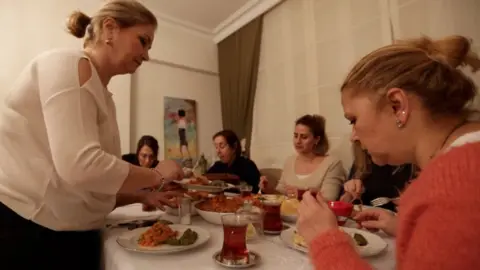 BBC
BBCThe piping-hot tea washes down the Turkish classics: stuffed vine-leaves, cheese pie and bulgur salad.
For Emel Resuloglu and her circle it's a monthly tradition: the women's get-together around the dinner table, or "gün" in Turkish, when one member of the group gets a little money or a gold coin.
Turkey cherishes its traditions. But there's one that some here feel is holding the country back socially and economically - that of women not working, cast only as the home-maker.
"I got a university place but my father didn't want me to go", Ms Resuloglu says, as a freshly-baked cake is added to the table. "So I didn't work, I married and had children at 21 and I regret not studying.
"Some women can't find jobs and others in Turkey are married off young. It's an old-fashioned mentality."
Just 34% of women in Turkey work, by far the lowest of the 35 industrialised countries of the Organisation for Economic Cooperation and Development (OECD) where the average is 63%.
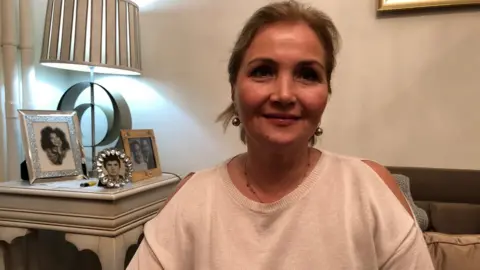
Critics of President Recep Tayyip Erdogan say his rhetoric is worsening the situation. At a rally two years ago, he called women who aren't mothers "deficient". Previously, he's urged women to have at least three children and denounced birth control as "treason".
Turkey now ranks 130 of 144 in the gender gap index of the World Economic Forum, based on access to health services, educational attainment, economic participation and political empowerment.
But Ravza Kavakci Kan, an MP with the ruling AK Party, says the government has liberated conservative women by revoking Turkey's old ban on headscarves in public institutions.
"This enables women who choose to wear the headscarf to join the workforce and get an education", she says. "But it takes time for policies to apply to real life."
Is it, though, right for the president to tell women how many children they should have or criticise those who choose not to have a family?
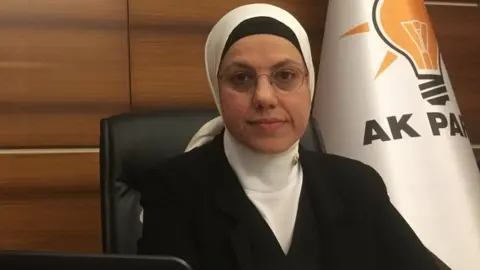
"As a president, he looks to the future of our society," she replies. "Turkey has an ageing population and we need more young people, so it's totally a demographic point of view."
There are just two female ministers in the Turkish cabinet - one is the minister for family.
"We're in a better place than we were - but we have a long way to go, just like many countries," concedes Ms Kavakci Kan.

Read more about Turkey

The economic impact of the gender imbalance is clear. A study by the consultancy firm McKinsey found that if women's participation in the Turkish workforce increased to the OECD average, it could boost the country's economic output by 20% by the year 2025.
To that end, the European Bank for Reconstruction and Development is providing financial support to 15,000 women entrepreneurs in Turkey. Among them is Aynur Gumussoy from the town of Kizilcahamam, in the country's conservative Anatolian heartland.
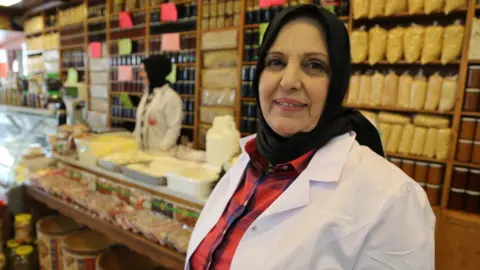
Twenty years ago, she went from selling food products on a street table to opening her own bakery, delicatessen and breakfast café - traditionally male-dominated businesses here.
The bakery churns out bazlama - the local speciality of round flatbread. And the delicatessen is a kaleidoscope of rich jams, ripe olives and creamy cheeses.
"When I started, I really struggled," she says. "People frowned upon women who worked, they pitied me. Even my parents were almost ashamed of me. But now I've become an example for others", pointing out several shops in the town now owned by women.
"My message to women is be brave and look to the future," she adds, laughing. "If I'd lost faith, I wouldn't be here today."
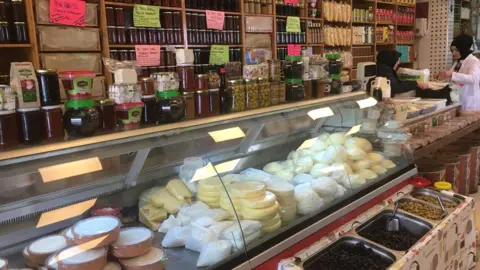
But for much of the country, she is still an exception.
The general trend is towards an increasingly patriarchal society, where conservative values and religion are dominating ever more. And the culture of female subservience here has gone hand-in-hand with soaring domestic violence.
Around 40% of women in Turkey suffer physical abuse. Some 300 to 400 a year die from it.
Official statistics show a 1,400% increase in reported cases of domestic violence between 2003 and 2010. The government says it's because women are being more encouraged to come forward.
On a cold night in Istanbul, some 200 or so feminist protesters marched through the largely-secular area of Besiktas, brandishing banners and chanting for gender equality.
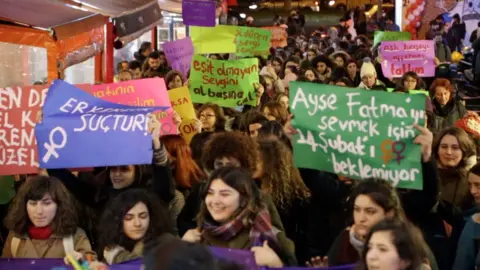
For activist Feride Eralp, keeping women housebound is a significant factor behind the rise in domestic abuse.
"The fact that women don't have economic freedom is one of the major reasons why they're unable to get away from violence in their lives," she says.
"They're forced to remain with partners who are violent because they're economically dependent on them.
"The mentality has to change here. From top to bottom, there's a view that women are unequal by nature and their place is within the family. They're expected only to be wives and daughters."
As the protesters snaked through the backstreets of Besiktas, they were ordered to stop by a group of policemen. They refused, pushing on to the heart of the area's fish market.
Theirs is a defiant voice, a call for women to work and stand up to male dominance. But in today's polarised Turkey, they are increasingly drowned out.
